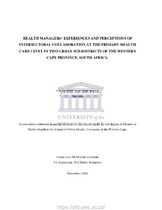| dc.contributor.advisor | Lembani, Martina | |
| dc.contributor.author | van der Walt, Nicolette | |
| dc.date.accessioned | 2021-03-29T12:45:10Z | |
| dc.date.available | 2021-03-29T12:45:10Z | |
| dc.date.issued | 2020 | |
| dc.identifier.uri | http://hdl.handle.net/11394/8079 | |
| dc.description | Magister Public Health - MPH | en_US |
| dc.description.abstract | Background: Actions on addressing the social determinants of health are necessary for reducing health inequities and improving health outcomes. These actions can, however, fall outside the scope of the health sector alone and require collaborative actions across sectors. Through the Western Cape Government’s stated commitment to following a whole-of-society approach to increase the wellness of people, this Province has committed to exploring intersectoral collaboration and action for health. This study is therefore aimed at exploring the experiences and perceptions of intersectoral collaboration and action for health amongst mid-level and frMethodology: The study design was qualitative and explorative in nature, using non-probability sampling to deliberately select study participants that were both relevant to the study and represented a diversity of views. Semi-structured interviews were conducted with seven health managers and non-participant observation of one intersectoral meeting was utilised to observe interactions that were relevant to the study. A thematic coding analysis approach was followed to inductively determine themes and analyse the data.ontline health managers working at the primary health care level in two sub-districts within the City of Cape Town, Western Cape Province. Results: Intersectoral collaboration for health at the primary health care level tends to take the form of collaborations between government departments, between the department of health and non-governmental organisations, between the public and private health sectors and between the Department of Health and the communities it serves. These collaborations overwhelmingly focus on expanding health services provision rather than addressing the social determinants of health. Conclusion: The concept of intersectoral collaboration and partnerships at the primary health care level in two sub-districts of the City of Cape Town, Western Cape, is perceived by health managers as being critical in addressing the social determinants of health. In practice, however, intersectoral collaboration and partnerships tend to focus on expanding health service provision and have limited value for addressing social determinants of health. | en_US |
| dc.language.iso | en | en_US |
| dc.publisher | University of the Western Cape | en_US |
| dc.subject | Intersectoral collaboration | en_US |
| dc.subject | Health Managers | en_US |
| dc.subject | Primary Health Care | en_US |
| dc.subject | Intersectoral action | en_US |
| dc.subject | Social Determinants | en_US |
| dc.subject | Collaborative Governance | en_US |
| dc.subject | Coordination | en_US |
| dc.subject | Urban | en_US |
| dc.subject | Western Cape | en_US |
| dc.subject | South Africa | en_US |
| dc.title | Health managers’ experiences and perceptions of intersectoral collaboration at the primary health care level in two urban sub-districts of the Western Cape Province, South Africa. | en_US |
| dc.rights.holder | University of the Western Cape | en_US |

